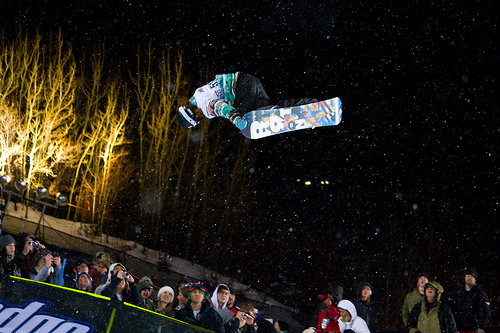I’m glad to introduce my friend and fellow writer Laura Leonard, who will be joining us in this space once a week or so. She’s writing today about why we care when our Olympic heroes fail…
We are now nine days into the Olympics, and if you’re anything like me you’re already struggling to remember what life was like before words like “slopestyle” and “pink eye” were a part of your regular vocabulary.
Tuesday’s big story was Shaun White’s failed bid at a threepeat in the men’s snowboarding halfpipe. Had he won his signature event, he would have been the first American male to win three straight golds in the same event. But he didn’t; after a disastrous first run that earned him 35 out of a possible 100 points and placed him 11th out of 12 finalists, he came up just short of the medal stand with a solid but imperfect second try (in halfpipe, only your best score counts). And now Swiss rider Iouri Podladtchiko, gloriously nicknamed “I-Pod,” is the Olympic champion of the snowboard halfpipe.
For even the most casual American Olympics fan, White’s failure was a disappointment. Sure, we like to see our medal count go up, but we also like our heroes to continue to uphold the narrative we have constructed around them. Though last night’s competition was the first competitive snowboarding I’ve watched since 2010, White’s “victory lap” when he was already assured the gold in Vancouver has stuck with me over these past four years. His jumps were so much higher, his spins and twists and grabs so much more transfixing–he made the impossible look not just easy but inevitable. He was a symbol of effortless perfection.
And then it ended. Could it, perhaps, be blamed on his hair–a modern day Samson? For this Games he cut his long locks to a professional style more befitting of his 27 years and just look what happened. Even weirder: I-Pod has long, curly red hair reminiscent of the mane that earned White the nickname “The Flying Tomato” and made him the recognizable face of, among other brands, Target, Hewlett Packard, and his own line of video games. But if there was any real disappointment, it was not White; it was time, and its relentless march forward. We would like to believe that it is possible to earn a place at the top and then to stay there comfortably. But the arrival of another Olympic Games and the crowning of a new champion is a reminder that, truly, nothing gold can stay.
The Olympics are, sometimes, about the dream made reality, the moment in which all the work put in and all the sacrifices made produce the hoped-for result. This is why we watch. But more often, they are about that inconvenient reality that even on a good day, our best efforts might not be enough. This is why they matter. It’s the truth that cuts right through the engineered-to-make-you-root-for-them backstory packages; I don’t want to meet the person who didn’t cry when Canadian skiier Alexandre Bilodeau defended his gold and beelined to his brother, Frederic, who has cerebral palsy and inspires his brother’s career, and yet even in that moment so engineered to inspire we are faced with difficult realities of limitations that can’t be overcome with more hours on the slopes. These Games aren’t perfect–as #SochiProblems provides constant proof–but neither is life. There is no meaning to be found in victory, because even that only lasts four years. The Olympics are perhaps one of our greatest reminders that a fulfilling life has to mean more than any specific result.
We have nine more days to watch enough curling, skeleton, ski jumping, and figure skating to last us for another 4 years. Pink eye notwithstanding, the ageless Bob Costas will be there to guide us the rest of the way, as a parade of world-class athletes sit on his couch with the moments they have dreamed of their entire lives now in the rear-view mirror, lamenting what went wrong or wondering if they will be able to do it all again in four years. Loss is part of sports and they will be able to handle it; and so will we, at least by the time the next backstory begins.





